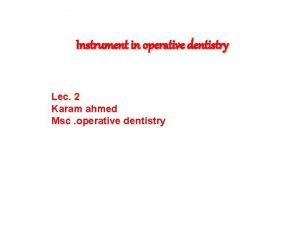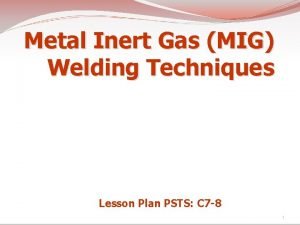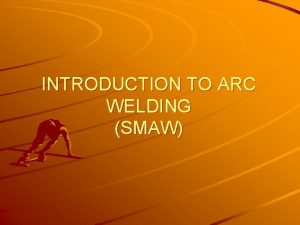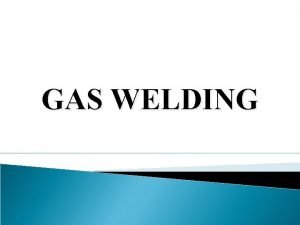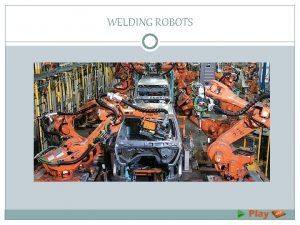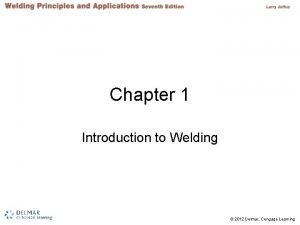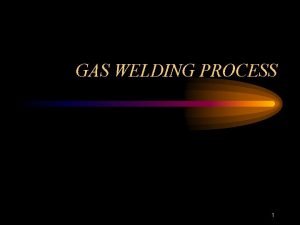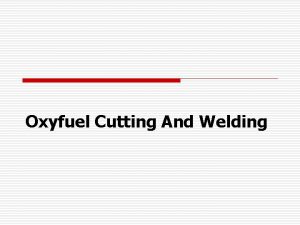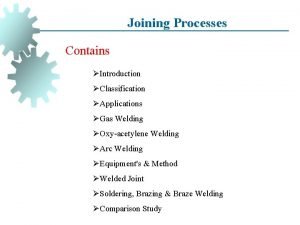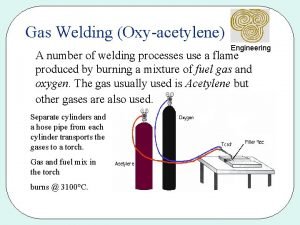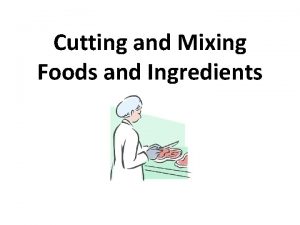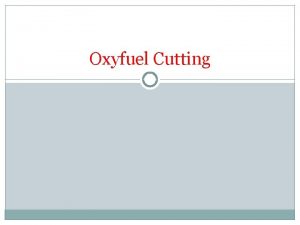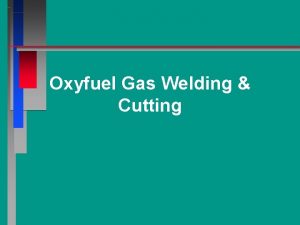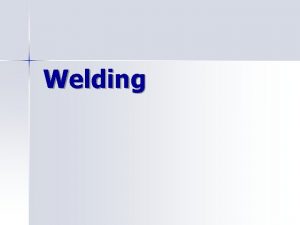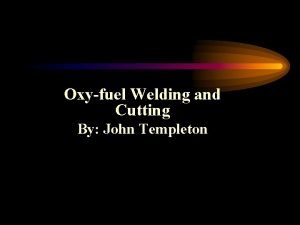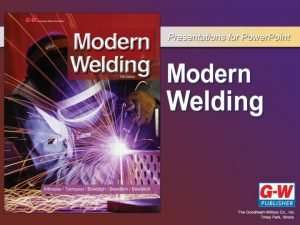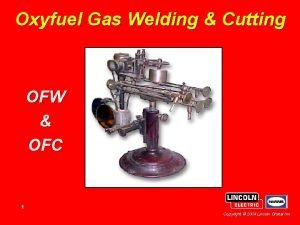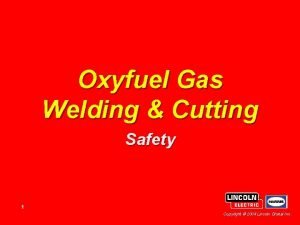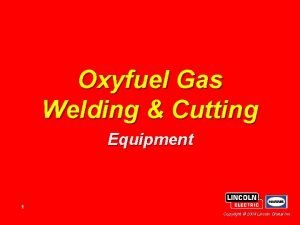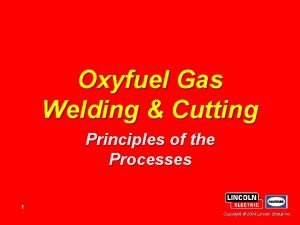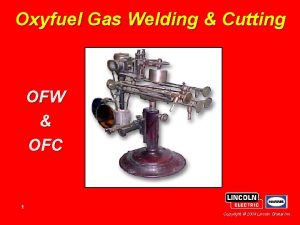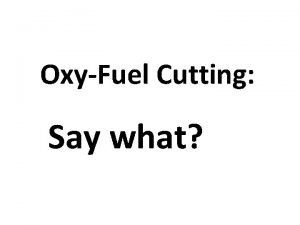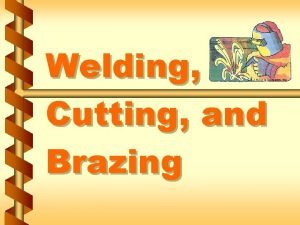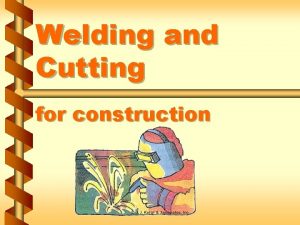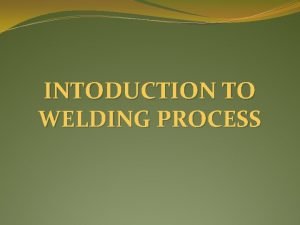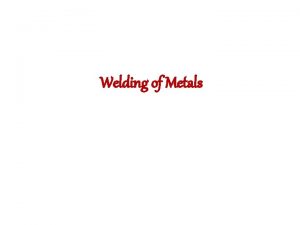Oxyfuel Cutting And Welding Introduction o o o


















- Slides: 18

Oxyfuel Cutting And Welding

Introduction

o o o Oxyfuel: the process of combining pure oxygen with a combustible fuel gas to produce a flame Can be used for welding, brazing, cutting, and heating metals Oxygen & fuel gases are stored under pressure in cylinders and are released as individual gases through valves, regulators, and hoses. n n Mixed as they flow through torch assemblies Burn as they are discharged through special tips

o Fuel gases: n n n o Propane, natural gas, propylene & acetylene Vary in their chemical composition React with the metal in different ways Factors to consider in selecting a gas: n n n Availability & cost Welding process or operation to be performed Thickness of metal & type of welded joint to be produced Physical properties of metals Chemical properties of metals

Propane (C 3 H)

o o Supplied in a liquid form under positive pressure, which varies with temperature Most oxyfuel cutting torches can use LP gas, but special hoses and cutting tips are required. Readily available in most areas Due to cost, propane cutting is heavily used in the metal recycling industry.

Propylene (C 3 H 6)

o o o o Has been used for approximately 30 years Stable in both liquid and gas states Economical Produces little slag Has a high heat value Does not have the withdrawal pressure limitations that are necessary with acetylene Approximately 5% propylene, 87% propane & traces of other gases

Acetylene (C 2 H 2)

o o Most widely used fuel gas for welding and cutting applications Produces a clean weld and a controllable flame Less stable and more expensive than other fuel gases Performs most functions well and is widely available

Compressed Natural Gas (CH 4)

o o Adaptable for cutting, soldering, brazing, and preheating A water seal or blowback valve to prevent backfiring into the gas supply line must protect the natural gas source.

Facts About Oxygen (O 2)

o o o o Odorless, colorless, tasteless & heavier than air Makes up about 20% of the atmosphere Will not burn by itself Produced commercially by causing air to liquefy Compressed into steel cylinders at 1, 800 to 2, 400 pounds per in 2 (psi) Supports combustion and is explosive if handled improperly Cylinder sizes = 80 to 244 ft 3

Facts About Acetylene (C 2 H 2)

o o o Colorless, but has a very distinct odor Highly combustible Cylinder sizes = 60 to 300 ft 3 Cylinder contains a porous substance saturated with liquid acetone Acetylene is pumped into the cylinder, displacing some of the acetone Not under extremely high pressure n o Full cylinder is pressurized to approximately 250 psi May not be withdrawn at a rate higher than 15 psi

Functions of Oxyfuel Heat

o o Oxyfuel cutting of mild carbon steel heats the metal to rekindling temperature (1, 400 o. F to 1, 800 o. F), then oxidizes and blows the slag from the cut with a stream of pure oxygen. Oxyfuel welding fuses two pieces of metal by heating them to the melting point with a combustible mixture of oxygen and fuel gas. n n n o Can be done with or without the use of a welding rod Brazing: the joining of metals by adding bronze filler Soft and hard solders (lead & silver alloys) are the filler materials used in soldering. The oxyfuel flame is also used to bend, shape, preheat, stress relieve, post-heat & temper metal.
 Triple bevel instrument
Triple bevel instrument Modified palm and thumb grasp in dentistry
Modified palm and thumb grasp in dentistry Chapter 18 basic chairside instruments and tray systems
Chapter 18 basic chairside instruments and tray systems Welding and cutting safety toolbox talk
Welding and cutting safety toolbox talk The appropriate cutting tool used in cutting fabrics
The appropriate cutting tool used in cutting fabrics Orthogonal cutting is dimensional metal cutting
Orthogonal cutting is dimensional metal cutting Welding joints and symbols
Welding joints and symbols The welding process by metal inert-gas (mig) welding is
The welding process by metal inert-gas (mig) welding is Introduction to smaw
Introduction to smaw Introduction to gas welding
Introduction to gas welding Gas welding conclusion
Gas welding conclusion Introduction to welding chapter 1
Introduction to welding chapter 1 Define oxy-acetylene flame
Define oxy-acetylene flame Introduction of gas welding
Introduction of gas welding Types of welding
Types of welding In a carburising flame the number of zones are
In a carburising flame the number of zones are Examples of cutting and paring tools
Examples of cutting and paring tools Cutting and mixing food items
Cutting and mixing food items Edge cutting tools examples
Edge cutting tools examples

